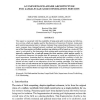Free Online Productivity Tools
i2Speak
i2Symbol
i2OCR
iTex2Img
iWeb2Print
iWeb2Shot
i2Type
iPdf2Split
iPdf2Merge
i2Bopomofo
i2Arabic
i2Style
i2Image
i2PDF
iLatex2Rtf
Sci2ools
125
click to vote
PPL
2008
2008
An Importance-Aware Architecture for Large-Scale Grid Information Services
This paper is concerned with the scalability of large-scale grid monitoring and information services, which are mainly used for the discovery of resources of interest. Large-scale grid monitoring systems have to balance between three competing performance metrics: query response time, imposed network overhead, and information freshness. Improving one of the three metrics will affect another; any solution will be based on a trade-off. The paper is motivated by the observation that existing grid monitoring systems can only be manually configured for a trade-off among the three metrics, which applies equally to all monitored resources; this implies that all resources in a grid are considered to be of equal importance. Assuming that in a large-scale grid setting this is unlikely to hold, the paper proposes an importance-based monitoring architecture for large-scale grid information services, based on an adaptation of the web crawling paradigm. The main idea is that, since not all resource...
Related Content
| Added | 14 Dec 2010 |
| Updated | 14 Dec 2010 |
| Type | Journal |
| Year | 2008 |
| Where | PPL |
| Authors | Serafeim Zanikolas, Rizos Sakellariou |
Comments (0)

